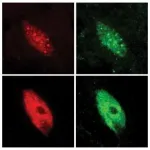(Press-News.org) URBANA, Ill. - Proteins have been quietly taking over our lives since the COVID-19 pandemic began. We've been living at the whim of the virus's so-called "spike" protein, which has mutated dozens of times to create increasingly deadly variants. But the truth is, we have always been ruled by proteins. At the cellular level, they're responsible for pretty much everything.
Proteins are so fundamental that DNA - the genetic material that makes each of us unique - is essentially just a long sequence of protein blueprints. That's true for animals, plants, fungi, bacteria, archaea, and even viruses. And just as those groups of organisms evolve and change over time, so too do proteins and their component parts.
A new study from University of Illinois researchers, published in Scientific Reports, maps the evolutionary history and interrelationships of protein domains, the subunits of protein molecules, over 3.8 billion years.
"Knowing how and why domains combine in proteins during evolution could help scientists understand and engineer the activity of proteins for medicine and bioengineering applications. For example, these insights could guide disease management, such as making better vaccines from the spike protein of COVID-19 viruses," says Gustavo Caetano-Anollés, professor in the Department of Crop Sciences, affiliate of the Carl R. Woese Institute for Genomic Biology at Illinois, and senior author on the paper.
Caetano-Anollés has studied the evolution of COVID mutations since the early stages of the pandemic, but that timeline represents a vanishingly tiny fraction of what he and doctoral student Fayez Aziz took on in their current study.
The researchers compiled sequences and structures of millions of protein sequences encoded in hundreds of genomes across all taxonomic groups, including higher organisms and microbes. They focused not on whole proteins, but instead on structural domains.
"Most proteins are made of more than one domain. These are compact structural units, or modules, that harbor specialized functions," Caetano-Anollés says. "More importantly, they are the units of evolution."
After sorting proteins into domains to build evolutionary trees, they set to work building a network to understand how domains have developed and been shared across proteins throughout billions of years of evolution.
"We built a time series of networks that describe how domains have accumulated and how proteins have rearranged their domains through evolution. This is the first time such a network of 'domain organization' has been studied as an evolutionary chronology," Fayez Aziz says. "Our survey revealed there is a vast evolving network describing how domains combine with each other in proteins."
Each link of the network represents a moment when a particular domain was recruited into a protein, typically to perform a new function.
"This fact alone strongly suggests domain recruitment is a powerful force in nature," Fayez Aziz says. The chronology also revealed which domains contributed important protein functions. For example, the researchers were able to trace the origins of domains responsible for environmental sensing as well as secondary metabolites, or toxins used in bacterial and plant defenses.
The analysis showed domains started to combine early in protein evolution, but there were also periods of explosive network growth. For example, the researchers describe a "big bang" of domain combinations 1.5 billion years ago, coinciding with the rise of multicellular organisms and eukaryotes, organisms with membrane-bound nuclei that include humans.
The existence of biological big bangs is not new. Caetano-Anollés' team previously reported the massive and early origin of metabolism, and they recently found it again when tracking the history of metabolic networks.
The historical record of a big bang describing the evolutionary patchwork of proteins provides new tools to understand protein makeup.
"This could help identify, for example, why structural variations and genomic recombinations occur often in SARS-CoV-2," Caetano-Anollés says.
He adds that this new way of understanding proteins could help prevent pandemics by dissecting how virus diseases originate. It could also help mitigate disease by improving vaccine design when outbreaks occur.
INFORMATION:
The article, "Evolution of networks of protein domain organization," is published in Scientific Reports [DOI: 10.1038/s41598-021-90498-8]. The work was supported by the National Science Foundation and the U.S. Department of Agriculture.
The Department of Crop Sciences is in the College of Agricultural, Consumer and Environmental Sciences at the University of Illinois.
In cases of breast cancer, bone metastasis - when cancer cells spread to new sites in the bone - causes the most breast cancer-related harm and is often incurable in advanced disease. A new study by University of Arizona Health Sciences researchers found that cancer cells become more aggressive when exposed to tissue stiffening and that these changes persist over time.
Tumor stiffening, which develops as diseased breast tissue becomes fibrotic, plays a major role in how breast cancer cells spread throughout the body. The paper, "Breast tumor stiffness instructs bone metastasis via maintenance of mechanical conditioning," published today in the journal Cell Reports, ...
A pair of College of Business professors and their doctoral student at The University of Texas at Arlington are exploring how ransomware attacks sometimes pit organizations against the law enforcement agencies trying to protect them.
Kay-Yut Chen, Jingguo Wang and Yan Lang are authors of a new study in the journal Management Science titled "Coping with Digital Extortion: An Experimental Study on Benefit Appeals and Normative Appeals." Chen and Wang are professors of information systems and operations management at UTA. Lang is a doctoral student in the department.
A ransomware attack is like a cyber hijacking, with criminals infiltrating and seizing an organization's data or computer systems and ...
In hospitals, we know that the nurses are the first to deal with patients in pain. For any ailment, including patients needing hemodialysis, the knowledge of pain management, the nurses have, allow them to provide optimal pain management.
This qualitative study aims to explore the experiences, perceptions, and beliefs of nurses serving in the hemodialysis unit in terms of pain management practices. The study helped identify the educational needs of the nurses to improve pain management in practice. A subjective sample of 16 nurses working in four out-patient hemodialysis units in Amman, Jordan, was hired for this research. Using semi-structured interviews, the data was collected.
The study found five themes and fifteen subcategories ...
Oak Brook, IL - The July edition of SLAS Discovery is a Special Edition featuring the cover article, "Development of a High-Throughput Screening Assay to Identify Inhibitors of the SARS-CoV-2 Guanine-N7-Methyltransferase Using RapidFire Mass Spectrometry" by Lesley-Anne Pearson, Charlotte J. Green, Ph.D., De Lin, Ph.D., Alain-Pierre Petit, Ph.D., David W. Gray, Ph.D., Victoria H. Cowling, Ph.D., and Euan A. F. Fordyce, Ph.D., (Drug Discovery Unit, School of Life Sciences, University of Dundee, Dundee, UK).
In January 2021, a survey of immunologists, infectious-disease researchers and virologists found that 90% of respondents believe SARS-CoV-2 will become endemic, continuing to circulate in pockets of the global population for years to come. Even as vaccines are ...
Boulder, Colo., USA: GSA's dynamic online journal, Geosphere, posts articles online regularly. Locations and topics studied this month include the central Appalachian Mountains; fossil pollen in Colombia; the precision and accuracy of model analyses; the Bone Spring Formation, Permian Basin, west Texas; and the geochronology of modern river sediment in south-central Alaska. You can find these articles at https://geosphere.geoscienceworld.org/content/early/recent .
Spatially variable syn- and post-Alleghanian exhumation of the central Appalachian Mountains from zircon (U-Th)/He thermochronology
Luke C. Basler; Jaclyn S. Baughman; Michelle L. Fame; Peter J. Haproff
Abstract: To assess spatial and temporal patterns of Phanerozoic orogenic burial and subsequent ...
Key Takeaways:
Research reveals consumer demand declines when product packaging and marketing materials removed the claim, "Made in USA" and increase when the claim was featured.
The impact on sales is insufficient to convince some companies to manufacture more products in the United States but enough to incentivize companies to make deceptive "Made in USA" claims.
CATONSVILLE, MD, June 30, 2021 - Pick up any product in just about any store and you're likely to find information that indicates the country of origin of the product. The U.S. Federal Trade Commission (FTC) requires this for any imported product, but not for products made in the United States. When you see the words "Made in USA" on a product, it's purely for marketing purposes. So, does it work?
According to a ...
LA JOLLA--(June 30, 2021) Scientists--and gardeners--have long known that plants grow taller and flower sooner when they are shaded by close-growing neighbors. Now, for the first time, researchers at the Salk Institute have shown the detailed inner workings of this process.
The study, published June 17, 2021, in Nature Genetics, offers a new understanding of how gene activity directs plant growth, and how quickly plants respond to their environment--with shifting light conditions triggering molecular changes in as little as five minutes. The findings provide insights ...
When it comes to defense, the body relies on attack thanks to the lymphatic and immune systems. The immune system is like the body's own personal police force as it hunts down and eliminates pathogenic villains.
"The body's immune system is very good at identifying cells that are acting strangely. These include cells that could develop into tumors or cancer in the future," says Federica Eduati from the department of Biomedical Engineering at TU/e. "Once detected, the immune system strikes and kills the cells."
Stopping the attack
But it's not always so straightforward as tumor cells can develop ways to hide themselves from the immune system.
"Unfortunately, tumor cells can block the ...
Growing resistance to our go-to antibiotics is one of the biggest threats the world faces. As common bacteria like strep and salmonella become resistant to medications, what used to be easily treatable infections can now pose difficult medical challenges.
New research from the University of Georgia shows that there may be more antimicrobial-resistant salmonella in our food animals than scientists previously thought.
Using technology she developed, UGA researcher Nikki Shariat and Amy Siceloff, a first-year doctoral student in UGA's Department of Microbiology, found that traditional culturing methods used to test livestock for problematic bacteria often miss drug-resistant ...
Since the onset of the COVID-19 pandemic last year, medical experts have stressed the importance of having a plan in the event of a positive test result. Where should you self-isolate? Do you have personal protective equipment for family members? Who should you notify about your diagnosis? An overwhelming 96% of healthy, educated adults surveyed by University of Houston researchers in the early stages of the pandemic did not have a comprehensive plan in mind, while 62% didn't have a plan at all.
"What that suggests is that it was difficult even for very high functioning people to digest and use all the complex information that was quickly emerging about ...




